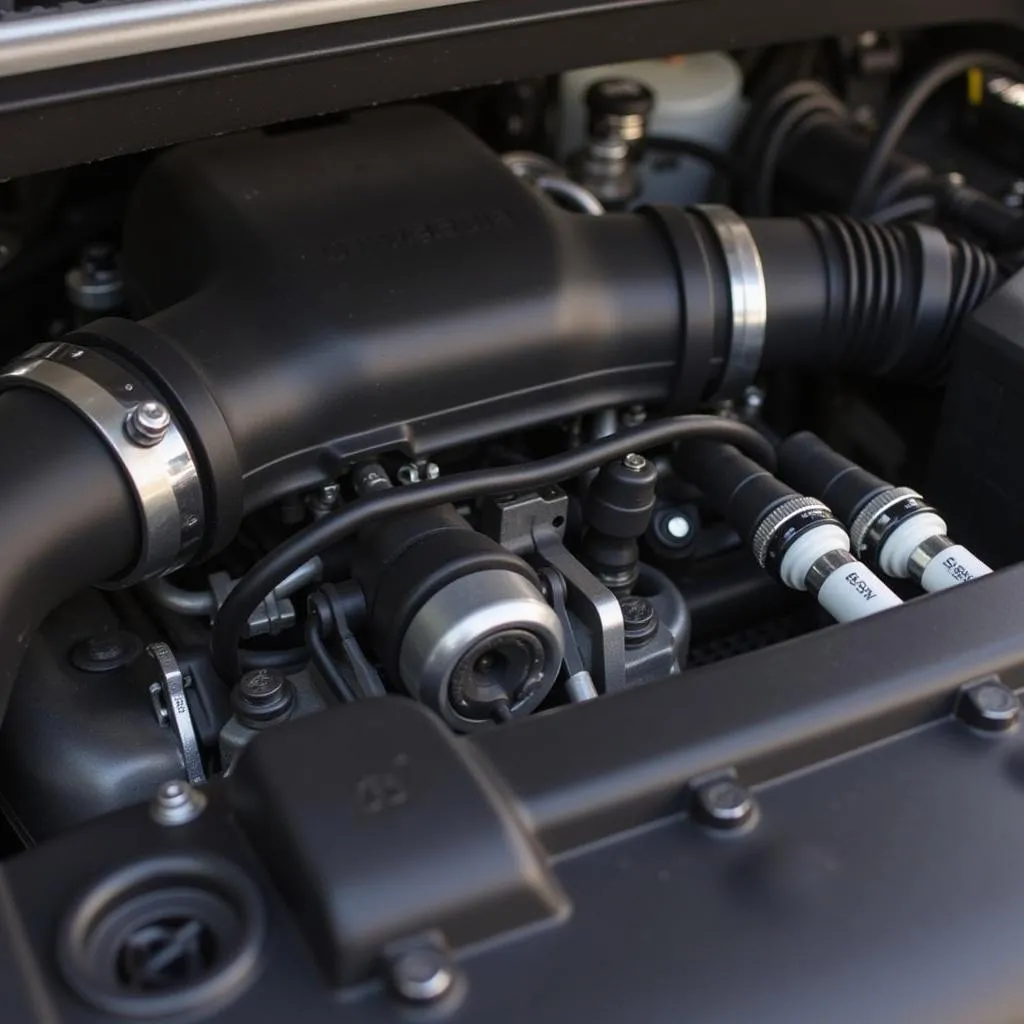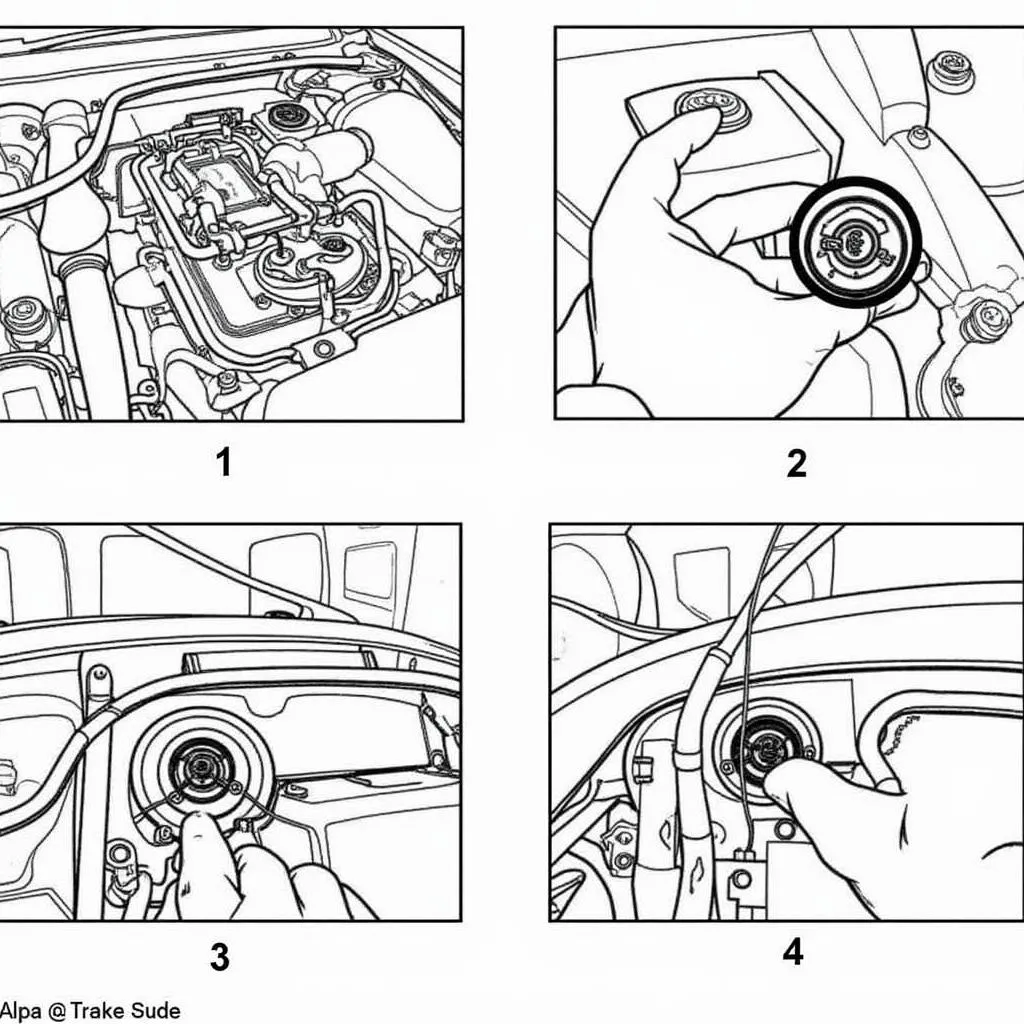The dreaded “Check Engine” light flashing on your dashboard is never a welcome sight, especially when it’s accompanied by a rough idle and noticeable performance hiccups. If you’re the owner of a 2009 Chevy Traverse and your OBD scanner throws out a P0300 code, it’s signaling a random or multiple cylinder misfire. While this code might seem intimidating at first, understanding what it means and the common culprits behind it can empower you to get your Traverse back on the road smoothly.
 2009 Chevy Traverse Engine
2009 Chevy Traverse Engine
What Does a P0300 Code Mean?
A P0300 code indicates that your engine’s control module (ECM) has detected that one or more cylinders are not firing properly. Instead of pinpointing a specific cylinder (like a P0301 for cylinder 1, for example), the P0300 code suggests a more widespread issue impacting the combustion process across multiple cylinders randomly.
This randomness is what makes diagnosing a P0300 code a bit trickier than other misfire codes. It’s like playing a game of engine whack-a-mole! However, don’t be discouraged. By understanding the potential causes, you can systematically troubleshoot the issue.
Common Causes of a P0300 Code in a 2009 Chevy Traverse
A variety of factors can contribute to a P0300 code in your Traverse. Here are some of the most frequent offenders:
-
Spark Plugs and Ignition Coils: Worn-out spark plugs or faulty ignition coils are classic culprits behind misfires. Over time, spark plugs can become fouled or worn, while ignition coils can degrade, leading to weak or inconsistent sparks.
-
Vacuum Leaks: Any leaks in your engine’s vacuum system can disrupt the air-fuel mixture, causing misfires. Check your vacuum hoses, intake manifold gaskets, and other vacuum components for cracks, leaks, or loose connections.
-
Fuel System Issues: A malfunctioning fuel pump, clogged fuel filter, or faulty fuel injectors can starve your engine of the fuel it needs for proper combustion, resulting in misfires.
-
Oxygen (O2) Sensors: While less common, faulty O2 sensors can send inaccurate data to the ECM, potentially causing the engine to misinterpret the air-fuel ratio and misfire.
-
Catalytic Converter: A clogged catalytic converter can create excessive exhaust backpressure, interfering with the engine’s ability to expel exhaust gases efficiently, and leading to misfires.
 Chevy Traverse OBD Scanner
Chevy Traverse OBD Scanner
Diagnosing and Fixing a P0300 Code
While this list covers some of the main areas to investigate, pinpointing the exact cause of a P0300 code requires a systematic approach:
-
Start Simple: Begin by inspecting your spark plugs and ignition coils for visible signs of wear, damage, or fouling. Replacing spark plugs as part of regular maintenance is always a good preventative measure.
-
Check for Leaks: Inspect all vacuum hoses and connections for cracks, loose clamps, or signs of deterioration. A hissing sound coming from the engine bay could indicate a vacuum leak.
-
Fuel System Check: If you suspect a fuel delivery issue, check your fuel pressure, examine the fuel filter, and consider having a mechanic test your fuel injectors.
-
Sensor Inspection: While visually inspecting O2 sensors might not reveal much, a mechanic can use a scan tool to monitor their readings and identify any potential issues.
-
Advanced Diagnostics: If the problem persists, more in-depth diagnostics might be necessary. This could involve using specialized tools to analyze exhaust gases, test compression, or examine the timing chain/belt for any issues.
Addressing a P0300 Code: DIY or Mechanic?
 Chevy Traverse Spark Plugs Replacement
Chevy Traverse Spark Plugs Replacement
Basic maintenance tasks like inspecting spark plugs, replacing air filters, and checking for visible vacuum leaks are often manageable for DIY enthusiasts. However, if you’re not comfortable working on your vehicle’s engine or lack the necessary tools and experience, seeking professional help is recommended.
A qualified mechanic can accurately diagnose the root cause of the P0300 code using advanced diagnostic equipment and their expertise. They can also safely and effectively perform any necessary repairs, ensuring your Traverse is running at its best.
Ignoring a P0300 Code: What’s at Stake?
It can be tempting to overlook a P0300 code, especially if your Traverse seems to be running “well enough.” However, ignoring this warning sign can lead to more severe and costly problems down the road.
Continued driving with a misfiring engine can damage your catalytic converter, a costly component to replace. Additionally, a misfire can negatively impact your fuel economy, costing you more at the pump.
Preventing Future P0300 Codes
Preventing is always better than curing. Sticking to a regular maintenance schedule for your 2009 Chevy Traverse can go a long way in preventing future P0300 codes:
-
Regular Spark Plug Replacement: Adhere to your Traverse’s recommended spark plug replacement intervals.
-
Fuel System Upkeep: Regularly replace your fuel filter and consider using a fuel system cleaner to keep your fuel injectors in optimal condition.
-
Air Filter Changes: A clean air filter ensures proper airflow to your engine, contributing to efficient combustion.
-
Addressing Issues Promptly: Don’t ignore any unusual engine noises, performance issues, or warning lights.
By taking proactive steps to maintain your Traverse and address any potential issues promptly, you can minimize the likelihood of encountering the dreaded P0300 code again.
FAQs About P0300 Codes in a Chevy Traverse:
1. Can I still drive my Traverse with a P0300 code?
It’s not recommended to drive for extended periods with a P0300 code. While short trips to a mechanic might be unavoidable, prolonged driving with a misfiring engine can cause further damage.
2. How much does it cost to fix a P0300 code?
The cost to fix a P0300 code can vary greatly depending on the underlying cause. Simple fixes like spark plug replacements are relatively inexpensive, while more complex issues like catalytic converter replacements can be significantly pricier.
3. Will a P0300 code clear itself?
While some OBD codes might clear themselves after a certain number of driving cycles, a P0300 code typically won’t go away on its own. Addressing the underlying mechanical issue is crucial to clearing the code.
4. Can bad gas cause a P0300 code?
Yes, using low-quality fuel or fuel contaminated with water or debris can contribute to misfires and trigger a P0300 code.
5. How long does it take to fix a P0300 code?
The repair time for a P0300 code is as varied as its causes. Simple fixes might take less than an hour, while more complex repairs could require several hours or even a full day.
Need More Help with Your Chevy Traverse?
For more information on Chevy OBD codes, check out our articles on chevy obd code p0302, chevy traverse obd light, or 2009 chevrolet traverse obd code p0p. If you’re dealing with other issues, you can find a wealth of information on 2012 traverse obd or browse our comprehensive guide to chevy obd trouble codes.
If you’re experiencing a P0300 code in your 2009 Chevy Traverse, remember that early detection and prompt action are key. Don’t let a minor misfire escalate into a major engine headache. Addressing the issue promptly will not only save you potential headaches and costly repairs down the road but also keep your Traverse running smoothly for miles to come.
If you need help diagnosing or fixing your 09 Traverse Obd P0300 Code, don’t hesitate to contact us via WhatsApp at +1(641)206-8880, email us at [email protected], or visit our workshop at 276 Reock St, City of Orange, NJ 07050, United States. Our dedicated team is available 24/7 to provide you with expert assistance and support.
